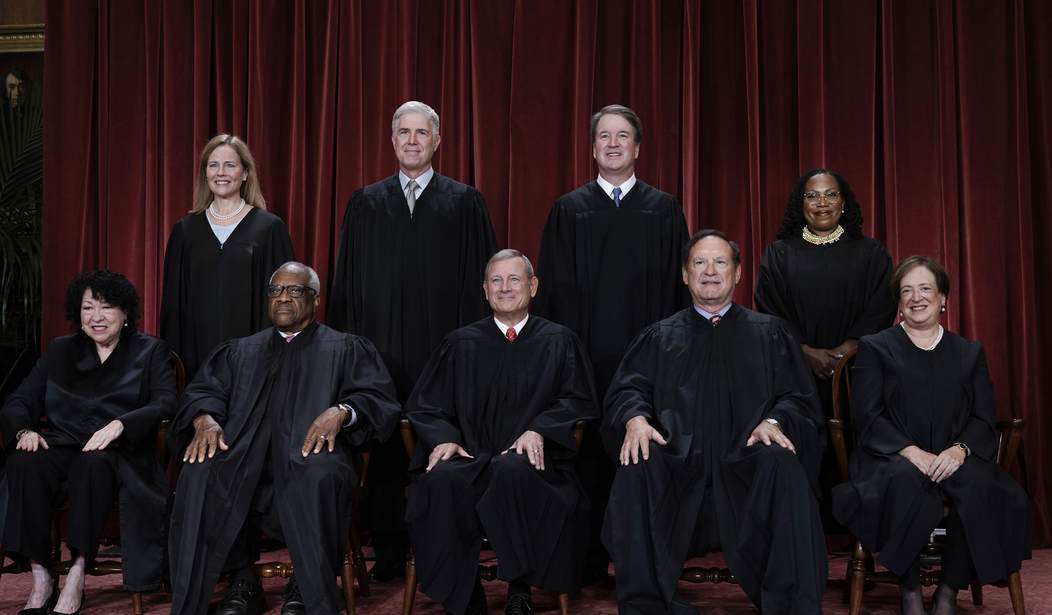Texas can finally begin to enforce its new state law against illegal immigration -- but not after a head-spinning 24 hours. Late yesterday, CBS News reported that the Supreme Court allowed a stay on enforcement of SB4 to lapse. Within an hour, the court then reinstated its stay, only more broadly -- a signal that the court might look disfavorably on Texas' arguments.
But just like that, a 6-3 court lifted its stay, this time for good ... we think. Maybe!
The Supreme Court on Tuesday gave Texas officials permission to jail and prosecute migrants suspected of crossing the U.S. southern border without authorization, greenlighting the enforcement of a state immigration law known as SB4 that the Biden administration has called unconstitutional.
Denying a request from the Justice Department, the high court allowed the controversial Texas law, one of Gov. Greg Abbott's signature immigration policies, to take effect while the U.S. Court of Appeals for the 5th Circuit considers the measure's legality.
Actually, this lifts a stay on another stay. The Fifth Circuit accepted an appeal of a lower-court ruling that rejected the law as an unconstitutional infringement of the Supremacy Clause. They then stayed their own ruling while the Biden administration appealed to the Supreme Court, which extended the stay while it considered the emergency request to vacate the stay. Yesterday, that temporary stay expired, only to have Justice Samuel Alito issue a new stay ... on the stay.
Confused? Stay tuned!
At this point, though, the matter looks a little more straightforward. The lower court ruling has been enjoined while the Fifth Circuit reviews Texas' appeal, and that injunction strongly suggests that the appellate court will rule in Texas' favor. The apparent 6-3 ruling today strongly suggests that the Supreme Court will look favorably on the matter, for the same reason: courts do not issue injunctions unless the party is likely to prevail at trial and substantial harms will occur without an injunction. Given that Texas seems to have convinced both courts of the necessity of the injunction against the lower court ruling and now have permission to enforce this law, it seems the two courts see Texas as the likely victor in this legal battle.
For now, anyway. And that may be more true about the Fifth Circuit than the Supreme Court anyway, which ended up deciding this on procedural grounds, as you'll see.
It took a while for the court to publish the opinion correctly, but we do have the reasoning now. And the majority leans heavily on potential harms in its decision to declare Game On for SB4. Technically this is an order, so there's no "ruling," but Justice Amy Coney Barrett writes a concurrence:
That such stays are “administrative” does not mean they are value neutral. Their point is to minimize harm while an appellate court deliberates, so the choice to issue an administrative stay reflects a first-blush judgment about the relative consequences of staying the lower court judgment versus allowing it go to into effect.2 Take this case. Texas argues that the District Court’s injunction of S. B. 4 prevents it from addressing an escalating crisis at the border; the United States argues that S. B. 4 undermines foreign relations and injures its sovereign interest in enforcing federal law, including those provisions granting certain migrants reprieve from removal.3 In the end, the Fifth Circuit might decide that the Nken factors favor the United States and decline to stay the injunction pending appeal. But for the brief period of uncertainty—i.e., the time it takes the court to deliberate—the Fifth Circuit apparently concluded that the consequences of erroneously enjoining the enforcement of S. B. 4 would be worse than those of erroneously lifting the injunction.
But in the end, Barrett sees this more as a procedural error on the part of the Biden administration and the Fifth Circuit:
The time may come, in this case or another, when this Court is forced to conclude that an administrative stay has effectively become a stay pending appeal and review it accordingly. But at this juncture in this case, that conclusion would be premature. The applicants’ opposition to the administrative stay included a request that any such stay itself be stayed for seven days pending an application to this Court, and the Fifth Circuit granted that request in its order. It is surprising that both the parties and the panel contemplated from the start that this Court might review an administrative stay. Before this Court intervenes on the emergency docket, the Fifth Circuit should be the first mover: It should apply the Nken factors and decide the motion for a stay pending appeal. It can presumably do so promptly. Texas’s motion for a stay pending appeal was fully briefed in the Fifth Circuit by March 5, almost two weeks ago. Merits briefing on Texas’s challenge to the District Court’s injunction of S. B. 4 is currently underway. If a decision does not issue soon, the applicants may return to this Court.
All three liberal justices combined into two written dissents. While Barrett relied on procedure, it appears Justices Sonia Sotomayor and Ketanji Brown Jackson were prepared to rule on behalf of the Biden administration:
Today, the Court invites further chaos and crisis in immigration enforcement. Texas passed a law that directly regulates the entry and removal of noncitizens and explicitly instructs its state courts to disregard any ongoing federal immigration proceedings. That law upends the federalstate balance of power that has existed for over a century, in which the National Government has had exclusive authority over entry and removal of noncitizens.
Presumably, Sotomayor and Jackson won't have much need for oral arguments when this case comes back to the Supreme Court. Justice Elena Kagan is more cautious and professional, objecting to the procedural grounds used by the majority:
I respectfully dissent from the Court’s denial of this application to vacate the stay. In my judgment, the applicants satisfy the four-factor test set out in Nken v. Holder, 556U. S. 418, 434 (2009), governing when a stay pending appeal is appropriate. My views of the merits are, as always in this posture, preliminary. But the subject of immigration generally, and the entry and removal of noncitizens particularly, are matters long thought the special province of the Federal Government. See Arizona v. United States, 567U. S. 387, 394 (2012); Chy Lung v. Freeman, 92 U. S. 275,280 (1876). Given that established understanding, I would not allow Texas Senate Bill 4 to go into effect. And in the circumstances, I do not think the Fifth Circuit’s use of an administrative stay, rather than a stay pending appeal, should matter.
It does seem surprising that both courts allowed the law to go into effect. Sotomayor and Jackson have precedent on their side; the courts have ruled in the past that the Supremacy Clause gives the federal government jurisdiction on immigration policy. It also has ruled in the past that the manner of enforcement is left to the federal government as well; a failure to apply resources to certain methods of enforcement (or a policy that deprioritizes enforcement) wouldn't necessarily shift jurisdiction to the state. However, Texas will argue that states can pass laws that mirror federal laws (and vice versa) and that both sovereigns can enforce their own laws as they see fit.
Maybe the Fifth Circuit will agree to that, at which point the six conservative justices will have to consider the merits rather than the process. But one has to think that if those justices didn't already think that the merits favored Texas that they would have overlooked the procedural issues and kept the law from coming into force.
At any rate, stay tuned ... and tune to stays, or something.








Join the conversation as a VIP Member